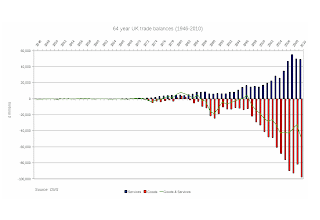Negative real interest rates - Bill Gross
Bill Gross is the head of PIMCO the largest bond investor fund in the world, yesterday in an interview on CNBC in the US he said this about interest rates offered to savers and the impact of inflation on them:
“It means that savers are being disadvantaged and will be disadvantaged for perhaps five, ten to fifteen years relative to debtors." "What policymakers are trying to do is rebalance this imbalance in terms of too much debt and too attractive rates on savings. What happens since 1946 to 1979 in the UK and the U.S., in order to rebalance balance sheets, was that the U.S. basically kept interest rates at 2.5% for much of that period of time and offered substantially lower real interest rates. That is what will be done here, and basically, it is called financial repression. We call it pocket picking. We simply suggest that investors look into other areas in order to achieve returns."
The rate of return (the interest rate) offered on cash savings is reduced by inflation, the rate of return after accounting for that reduction is the real rate of return. When inflation is greater than the interest rate the rate of return is negative, you lose exchange value, year after year. When inflation is less than the interest rate on the savings the return is positive.
The bank of England has kept interest rates at nearly zero for over two years now, and by this policy has caused savers in the UK to suffer a negative real rate of return - a negative real rate of interest. All cash savings are becoming less valuable every year, every month.
On top of this injustice to the prudent (that is to say 'savers', people who put something aside) the administrators of our country (in this case the ONS) lie and deceive as to the extent of inflation. So not only is the real rate of interest negative it is far more negative than the official figures suggest.
The negative return for savers generates a loss in purchasing power which is transferred to debtors. This is a neat policy which punishes the prudent and careful (and generally the older generation) and rewards the greedy and profligate. The more you have borrowed the more you benefit. Obviously not every who borrows is greedy, debt is hugely beneficial in certain circumstances - such as when employed for investment in a productive business. But all those millions who lived beyond their means, maxed out their credit cards - they are being subsidised (bailed out, rescued, rewarded) by savers.
But hang on - weren't we all encouraged to borrow?
The rational response for any saver is to take their money out of the banking system, and invest it somewhere else. That will cause a depression.
“It means that savers are being disadvantaged and will be disadvantaged for perhaps five, ten to fifteen years relative to debtors." "What policymakers are trying to do is rebalance this imbalance in terms of too much debt and too attractive rates on savings. What happens since 1946 to 1979 in the UK and the U.S., in order to rebalance balance sheets, was that the U.S. basically kept interest rates at 2.5% for much of that period of time and offered substantially lower real interest rates. That is what will be done here, and basically, it is called financial repression. We call it pocket picking. We simply suggest that investors look into other areas in order to achieve returns."
The rate of return (the interest rate) offered on cash savings is reduced by inflation, the rate of return after accounting for that reduction is the real rate of return. When inflation is greater than the interest rate the rate of return is negative, you lose exchange value, year after year. When inflation is less than the interest rate on the savings the return is positive.
The bank of England has kept interest rates at nearly zero for over two years now, and by this policy has caused savers in the UK to suffer a negative real rate of return - a negative real rate of interest. All cash savings are becoming less valuable every year, every month.
On top of this injustice to the prudent (that is to say 'savers', people who put something aside) the administrators of our country (in this case the ONS) lie and deceive as to the extent of inflation. So not only is the real rate of interest negative it is far more negative than the official figures suggest.
The negative return for savers generates a loss in purchasing power which is transferred to debtors. This is a neat policy which punishes the prudent and careful (and generally the older generation) and rewards the greedy and profligate. The more you have borrowed the more you benefit. Obviously not every who borrows is greedy, debt is hugely beneficial in certain circumstances - such as when employed for investment in a productive business. But all those millions who lived beyond their means, maxed out their credit cards - they are being subsidised (bailed out, rescued, rewarded) by savers.
But hang on - weren't we all encouraged to borrow?
The rational response for any saver is to take their money out of the banking system, and invest it somewhere else. That will cause a depression.


Comments
Post a Comment